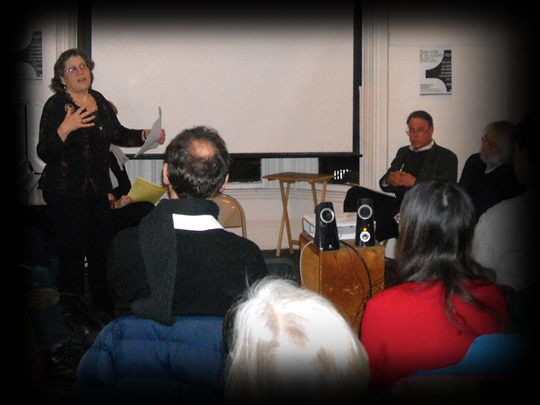In honor of our third anniversary, Asymptote’s Boston crew hosted “Translation in the Academy,” a conversation about the intersection of the growth of “translation studies” programs in universities and the praxis of professional translators. The panel was convened by our own contributing editor Ellen Elias-Bursac (along with plenty of help from Nina Beguš, Daniel Goulden, and Alex Sham!).
On the academic, translation-in-theory side of the ring: Karen Thornber, professor and current chair of Harvard University’s Department of Comparative Literature, and Edwin Gentzler, Director of the Translation Center at University of Massachusetts-Amherst. Representing translation in practice: Lloyd Schwartz, poet, active translator of Portuguese, and English professor at the University of Massachusetts-Boston, and Vivek Narayanan, poet and translator of Tamil. The panel was held at the Outpost 186 artspace in Cambridge, and true to Asymptote form, it was a room full of translators: of Japanese, of German, of Hebrew, and of Spanish, to name only a few of the languages represented in the diverse audience.
Karen Thornber spoke first on her work with the Institute for World Literature: a summer program dedicated to furthering the cause of world literature by convening scholars, students, and professional translators from all over the globe for workshops and seminars. She also discussed the changes in comparative literature programs over the past few decades: where once it was a staunch requirement for the Harvard scholar to at least know French, German, and either Greek or Latin—and absolutely taboo to admit to relying on translations—university departments are edging toward recognizing the need to learn languages outside the European core. It beginning to be okay to sometimes rely on translations, and studying translation and translations is necessary even for scholars of national literatures.
(Here Thornber used the example of the Japanese writer Ishikawa Tatsuzō, whose fictional account of the Nanjing Massacre [Ikite iru Heitai 生きている兵隊, Soldiers Alive] was immediately banned in Japan, but quickly translated into Chinese, where it became immensely popular and widely circulated. A competent scholar of Japanese literature, Thornber argued, would have to take the reception history of that translation into account when studying the work).
Next, Edwin Gentzler discussed the establishment of the Translation Center at University of Massachusetts-Amherst, an institute dedicated to furthering both the academic study of translation and training professional translators (theory and practice, unite!). Gentzler recalled that he was originally told by a department chair at the University of Massachusetts-Amherst that the university would never, ever be willing to hire a professor of translation; now, Gentzler’s translation center makes more money for the university than every other unit except the basketball team (!!!).
The work of the center, however, still faces significant challenges: American universities, Gentzler noted, still do not adequately teach the languages that face the highest demand for translation. Gentzler held himself out as an example of this mismatch: trained in several European languages, he found himself in the position of standardizing Kreyol spelling and finding decent word processing programs for Vietnamese. He had high praise for Asymptote, which he said continues the legacy of literary pioneers like Lawrence Ferlinghetti: “You’re ahead of us. You’re publishing what isn’t yet taught in schools.” (Aw, shucks).
Lloyd Schwartz read from a translation he did of a Ukrainian poem for a 1996 anthology of new Ukranian writing. Not knowing the language, Schwartz had to work from a literal translation of the original. He also discussed Robert Lowell and Elizabeth Bishop’s contrasting views on translation: Bishop believed being as faithful to the original as possible was a moral obligation; Lowell aimed to write a good English poem based loosely on the original. Yet even Bishop’s faithful translation of Brazilian poetry, Schwartz pointed out, couldn’t escape criticism. He recalled facing the wrath of an irate journalist who detested Bishop’s translation of Carlos Drummond de Andrade’s “Poema de Sete Faces,” which replaced a crucial rhyme of “Raimundo/mundo” with a rhyme of “Eugene/mean.” “What happened to the rhyme?” the journalist yelled, “How could she change Raimundo to Eu-hen-ey?”
We closed out the night with a presentation by Vivek Narayanan on a translation he contributed to Asymptote, of a selection from the Kuruntokai, an anthology of classical Tamil poetry dating back to the Second Century BCE. Narayanan noted that the classical Tamil of the work is unfamiliar even to native Tamil speakers, and is consequently always read “in translation” with commentary. “The past is a foreign country,” Narayanan said, “There is no native position from which a poem can be understood.” He explained his decision to work against the choices made by an earlier translator, the poet A.K. Ramanujan, whose translation is so iconic that it almost, Narayanan said, replaced the original in his head. “I believe in multiplicity,” he said, “There is no perfect translation. All translations are necessarily in conversation with each other.”
Following the panel, our esteemed panelists, Asymptoters, and audience lingered for a long time over wine and cheese to continue a great conversation among translators and to avoid the terrible weather—it was a brisk -5 Celsius here in Boston, and nobody was rushing to get back outside.

